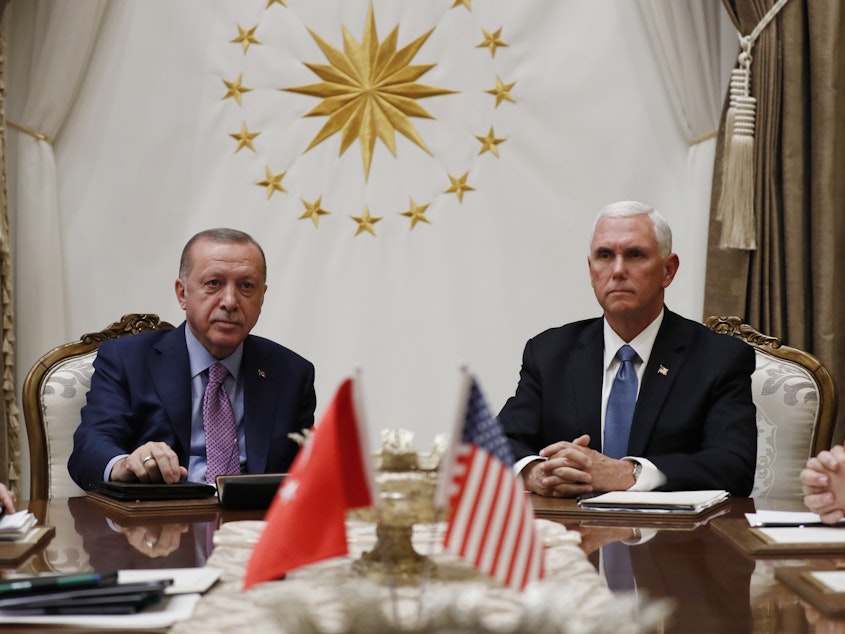Pence Says Turkey Has Agreed To Suspend Its Incursion Into Syria

U.S. Vice President Mike Pence says he's reached a deal with Turkish President Recep Tayyip Erdogan to suspend the Turkish incursion into northern Syria, amid international outcry over the growing humanitarian and security crisis.
Pence told reporters that Erdogan has agreed to a ceasefire of 120 hours to allow for the withdrawal of Kurdish YPG forces, which have been working with the U.S. in the fight against ISIS. The Kurdish forces will withdraw from a "safe zone" along the Turkish border with Syria that is about 20 miles wide, Pence said.
The Turkish operation "will be halted entirely on completion of the withdrawal," Pence said.
Pence led a delegation to Ankara, the Turkish capital, to try to convince Erdogan to stop Turkey's military incursion into Syria and enact an immediate ceasefire. These goals were considered highly unlikely ahead of the meeting – for example, Erdogan's senior advisor Gülnur Aybet told NPR's Morning Edition on Thursday that "the request for a ceasefire is not realistic in this at this stage."
The U.S. and Turkey were in talks for more than five hours, Pence said. Before Pence announced the news, President Trump sent a tweet thanking Erdogan and stating "Millions of lives will be saved!"
Sponsored
"This deal could NEVER have been made 3 days ago," Trump added. "There needed to be some 'tough' love in order to get it done. Great for everybody. Proud of all!"
"There's lots of challenges that remain but this effort tonight sets the conditions for the successful resolution of this particular piece, which created enormous risk and a real risk of instability," Secretary of State Mike Pompeo added at the news conference.
The Turkish campaign targeting Kurdish forces started after the Trump unexpectedly withdrew U.S. troops stationed in northeast Syria following a call with Erdogan. Turkey considers these Kurdish forces to be terrorist groups linked to militant organizations that stage attacks against the Turkish government. Kurdish-led forces have been crucial allies to the U.S. for years in the fight against ISIS.
Earlier this week, Trump decried Turkey's "dangerous and destructive path," even threatening that he is "fully prepared to swiftly destroy Turkey's economy." Yesterday, he appeared to dismiss the importance of the deepening crisis: "They have a problem at the border, it's not our border."
The humanitarian toll is mounting. The U.N. says more than 160,000 civilians have been displaced in the fighting.
Sponsored
The U.S. had imposed some limited sanctions on Turkish officials. Pence stated that with the implementation of the ceasefire, the U.S. would not impose any further sanctions on Turkey. And he added that "once a permanent ceasefire is in effect, the president has agreed to withdraw the economic sanctions that were imposed this last Monday."
Aybet told NPR that the Turkish objectives in northern Syria are clear: "Until the area is cleared from terrorists, our objective will not be fulfilled. When that objective is fulfilled, the operation is over."
In the U.S., Trump's handling of the situation in Syria has drawn criticism from both parties, including some of his close allies. "I fear this is a complete and utter national security disaster in the making and I hope President Trump will adjust his thinking," Republican Sen. Lindsey Graham said Wednesday.
The House passed a denunciation of the U.S. troop withdrawal in a resounding 354-60 vote on Wednesday. Likewise, Senate Majority Leader Mitch McConnell said Thursday that "my preference would be for something even stronger than the resolution the House passed."
McConnell had previously said that he is "gravely concerned by recent events in Syria and by our nation's apparent response thus far."
Sponsored
Since U.S. troops withdrew from northern Syria, Kurdish forces seeking protection have formed an alliance with troops from the Syrian regime.
The U.S. military has evacuated its main base in northeast Syria, where it trained Kurdish fighters to battle ISIS. U.S. military spokesperson Col. Myles Caggins told NPR's Daniel Estrin that as Turkish-backed fighters neared the base, U.S. planes "bombed the base to destroy an ammunition cache and make it harder for the base to be taken over as troops left." [Copyright 2019 NPR]
